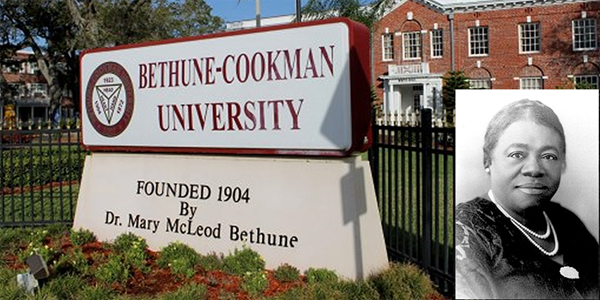The Bible teaches that faith the size of a mustard seed can move mountains. That's what young Mary McLeod Bethune did when she opened the Daytona Educational and Industrial Training School for Negro Girls in 1904 on a shoestring and a prayer.
The site was an abandoned garbage dump. She had $1.50 in working capital.

It opened with five students.
But the faith and determination that drove that amazing young Black woman more than a century ago manifested into a dynamic and growing Bethune-Cookman University today.
Bethune-Cookman University is one of the black colleges supported by the Black College Fund which provides financial support to maintain solid, challenging academic programs; strong faculties; and well-equipped facilities.
Over the decades, thousands of primarily Black students attended there to learn from the diverse curriculum that includes business management, marketing, homeland security, law enforcement biological and biometric sciences, and, of course, education.
Dr. Bethune was, among her many skills, a dynamic educator.
In 1923, Dr. Bethune's school merged with the Cookman Institute in Jacksonville and became co-ed. That's also when it gained affiliation with the Methodist Church, which continues today under the banner of the United Methodist Church.
The school became Bethune-Cookman College in 1931 before becoming a full-fledged university in 2007. It remains one of 11 remaining Historically Black Colleges and Universities affiliated with the United Methodist Church.

Dr. David Allen is a proud BC-U alum and currently serves as Superintendent of the North Central District of the Florida United Methodist Conference. He originally was attracted to the university by its renowned concert chorale, but then he noticed something more.
"It was transformational in a number of regards," he said. "They weren't just singing, they were ministering. That was the first time I saw that. It kind of planted a seed in me that, hey, that's what I want to do."
"In their religion and philosophy department, they could educate me in Greek. It was the only school doing that. If you're trying to grow in ministry and understand the Bible more and more, that was a plus. In all, it provided a platform for me to explore my call."
Today's BC-U campus has 99 buildings over 82 acres in Daytona Beach, and three of these buildings have been added to the National Register of Historic Places.
The university offers 32 majors spread over 40 undergraduate programs. It also has a thriving online program.
"I preached my first sermon at Bethune-Cookman," Dr. Allen said. "I am driven to give back to the upcoming generation and tell them about this amazing leader, entrepreneur, and educator.
"I make sure students understand that we are Methodists and understand our history. I feel indebted to that work."
And on July 13, Dr. Mary McLeod Bethune, the 15th child of former slaves, will take her rightful place among the giants of our nation. That's the date chosen to unveil the 8-foot tall, 6,130-pound work of art chiseled by sculptor Nilda Comas out of marble from an Italian quarry and named "The Black Rose."
"Think about it," Dr. Allen said. "Five little girls, faith in God, and their efforts in selling sweet potato pies. From those humble beginnings, we have a university.
"How could a Black woman, in that day and age, be geared to train United Methodist ministers? It was very inspiring to me then, and it still is today."
excerpt from a story by Joe Henderson, News Content Editor for FLUMC.org
One of seven apportioned giving opportunities of The United Methodist Church, the Black College Fund provides financial support to maintain solid, challenging academic programs; strong faculties; and well-equipped facilities at 11 United Methodist-related historically black colleges and universities. Please encourage your leaders and congregations to support the Black College Fund apportionment at 100 percent.





